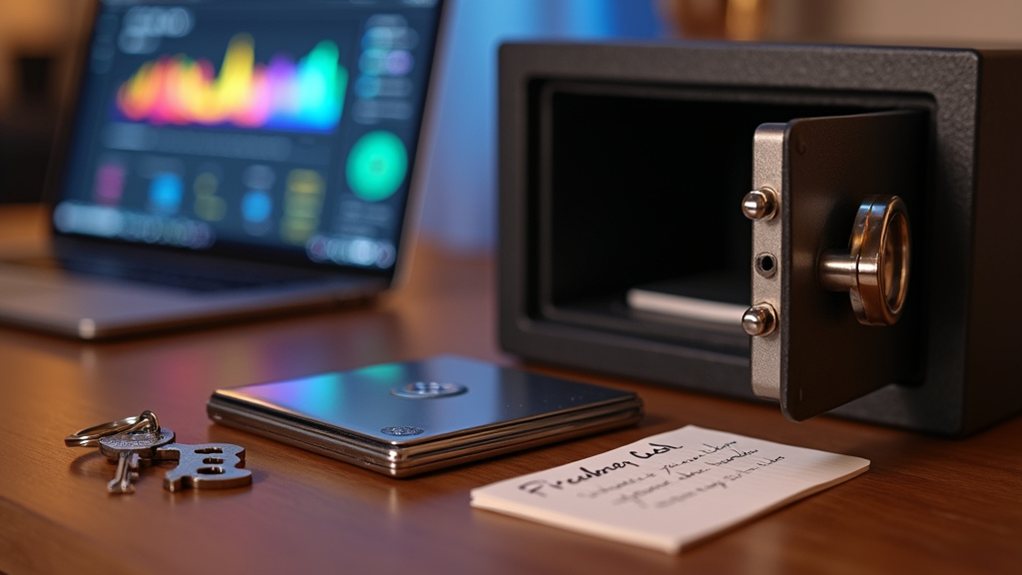Bitcoin investors store their assets safely using hardware wallets like Ledger and Trezor. These devices keep private keys offline, away from internet threats. Two-factor authentication adds protection for exchange accounts and software wallets. Cold storage options include paper wallets and air-gapped computers. Experts recommend backing up recovery phrases on paper and storing them in secure locations. Smart security practices include using dedicated devices and strong passwords. The following details offer deeper protection strategies.

As cryptocurrencies gain popularity, storing Bitcoin safely has become a top concern for investors. Security experts often recommend hardware wallets as one of the most effective ways to protect digital assets. These physical devices, such as those made by Ledger and Trezor, store private keys offline. This approach shields Bitcoin from online threats since transactions require physical access to the device. Many hardware wallets support multiple cryptocurrencies, making them versatile for diverse portfolios.
Two-factor authentication provides vital protection for Bitcoin storage. This security measure requires something the user knows (password) and something they have (like a phone for verification codes). Even if hackers steal a password, they can't access accounts without the second verification step. Users should enable 2FA on exchange accounts and software wallets whenever possible. Some hardware wallets offer 2FA features for added security.
Creating secure backups ranks as essential for Bitcoin owners. If a device breaks or gets lost, recovery words (seed phrase) allow users to restore their funds. Experts recommend writing these words on paper and storing copies in different secure locations like fireproof safes. Digital backups create vulnerability, so photos or computer storage of seed phrases should be avoided. Regular testing guarantees backups will work when needed. Metal backups provide fire and water protection for seed phrases, ensuring long-term durability against physical damage.
Cold storage solutions keep Bitcoin offline and away from internet threats. While hardware wallets qualify as cold storage, other options include paper wallets and specially prepared air-gapped computers. Many Bitcoin holders use a hybrid approach, keeping small amounts in connected "hot" wallets for transactions while storing the majority offline for safety. Hot wallets like Exodus offer features such as live portfolio tracking while maintaining compatibility with cold storage solutions.
Good operational security practices include using dedicated devices for crypto transactions, keeping all software updated, and watching for phishing attempts. Strong, unique passwords for each account help prevent unauthorized access. Password managers can generate and store complex passwords securely. Non-custodial wallets give users complete control over their private keys, eliminating the risk of third-party management.
Storage diversification reduces risk. Keeping all Bitcoin in one wallet creates a single point of failure. Many users split holdings between different storage methods. Multisignature wallets require multiple keys to authorize transactions, adding security layers. Using different hardware wallet brands prevents being affected by a flaw in any single product.
Caution with third-party services remains important. Exchanges and online wallets control private keys, creating potential risks. Research shows many hacks target these services rather than individual wallets. Users often limit amounts kept on exchanges, enable withdrawal restrictions, and prefer non-custodial options that let them control their keys. This combination of security practices helps protect Bitcoin from both technological vulnerabilities and human error.
Frequently Asked Questions
What Happens to My Bitcoins if I Die?
When someone dies, their bitcoins don't automatically transfer to heirs. Without proper planning, bitcoin assets can become permanently lost.
Bitcoins require private keys for access, which may disappear with the owner. Legal inheritance follows property laws, requiring documentation in wills or trusts.
Many families lose crypto assets due to lack of planning. Estate executors need clear instructions and access information to distribute digital assets to beneficiaries.
Can I Insure My Bitcoin Holdings Against Theft?
Bitcoin insurance options are limited but growing. Some exchanges insure assets held on their platforms, while specialized crypto insurance providers offer coverage against theft, hacking, and private key loss.
Premiums typically range from 1-5% of insured value annually. Insurance policies often exclude user errors and have coverage caps.
The industry lacks standardized regulations, though traditional insurers are slowly entering this market as institutional interest increases.
How Do Hardware Wallets Compare to Multisignature Setups?
Hardware wallets and multisignature setups offer different security approaches.
Hardware wallets store keys offline in secure chips, requiring physical confirmation for transactions. They're user-friendly with simple interfaces and cost between $50-$200.
Multisignature setups need multiple keys to authorize transactions, distributing risk across devices. They're more complex, requiring technical knowledge and longer transaction times, but can be free to set up.
Both systems protect against different security threats in their own ways.
Should I Split My Bitcoin Across Multiple Storage Methods?
Splitting Bitcoin across multiple storage methods is a common security practice.
Many Bitcoin owners divide their holdings between cold storage (offline) and hot wallets (online). This approach reduces the risk of losing everything if one method fails.
However, it does create more complexity and potential for user error. Some investors use a combination of hardware wallets, paper backups, and multisignature setups to protect different portions of their Bitcoin.
How Often Should I Update My Wallet Software?
Wallet software should be updated whenever a new version is released. Experts recommend checking for updates at least monthly. Critical security patches require immediate action.
The frequency varies by wallet type, with major updates typically occurring 2-4 times yearly and minor updates coming weekly or biweekly. Before updating, users should always backup their wallet and verify they're downloading from official sources to avoid scams.














